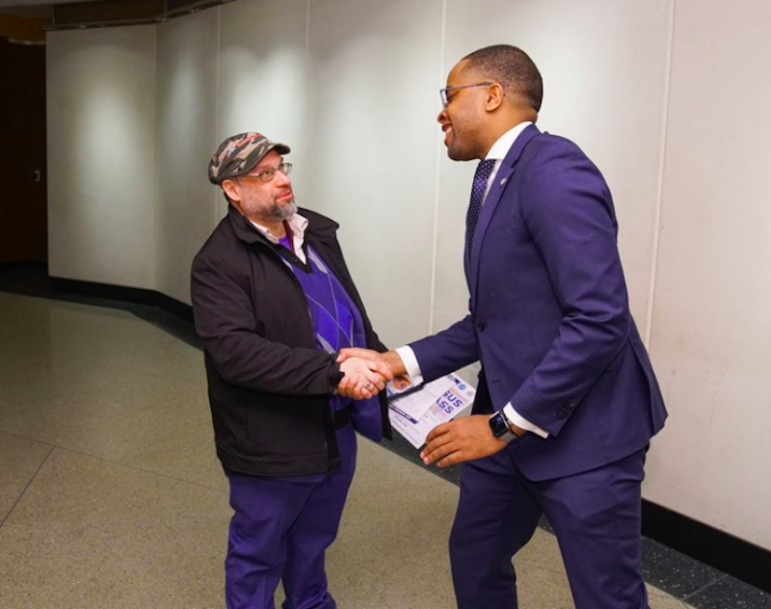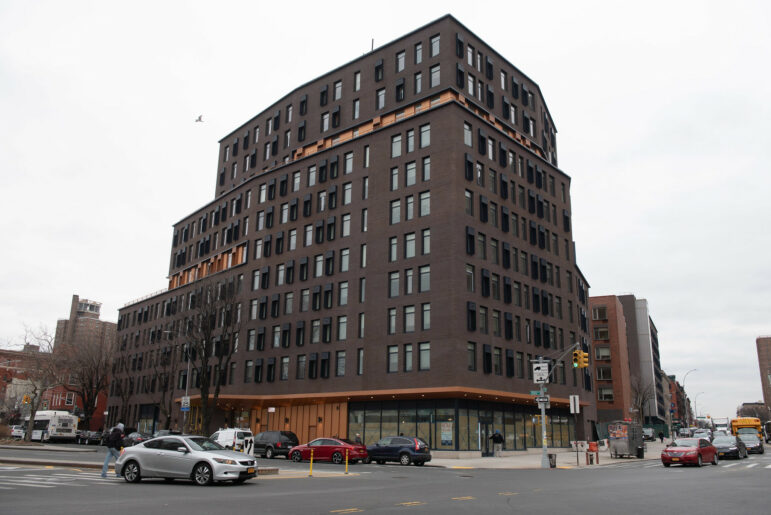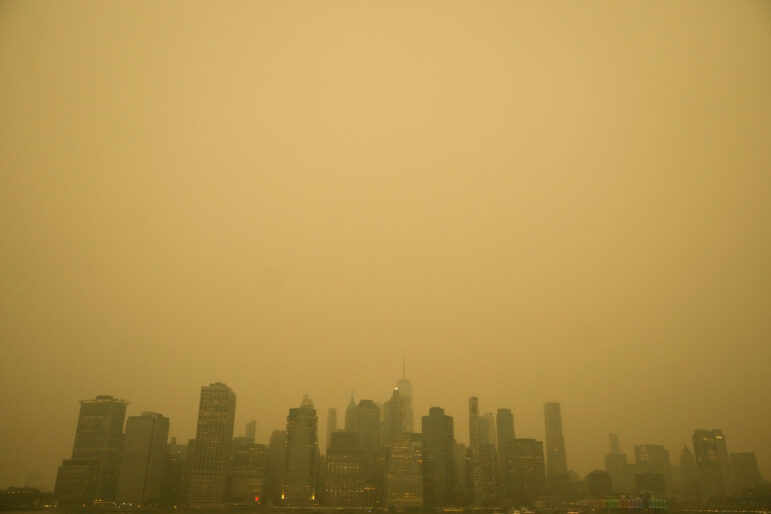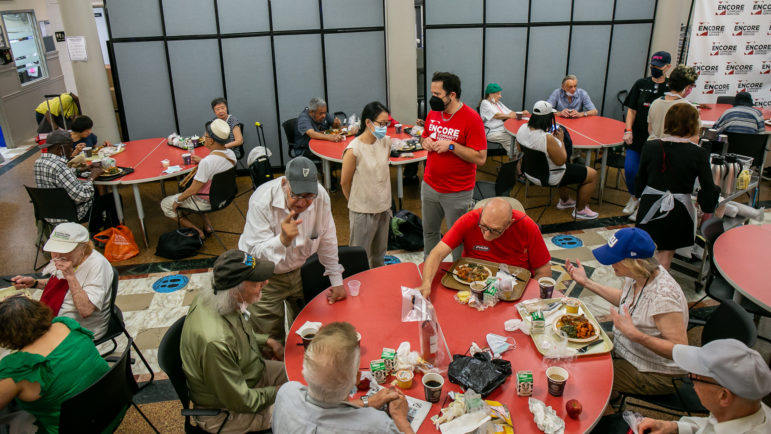
Housing and tenant advocates are pushing three pieces of legislation in Albany, which propose to eliminate rent for 90 days, continue the eviction and foreclosure moratorium and establish an emergency housing voucher for homeless New Yorkers during the pandemic.
However, real-estate industry leaders say those bills could stymie the economic recovery of the city and want local governments to focus on building more housing and saving commercial spaces and businesses.
At a Wednesday press event, tenant leaders from across the city told stories of how COVID-19 has impacted their personal and professional lives. Esteban Giron, a tenant leader with the Crown Heights Tenant Union, said he and his husband had both endured infection with COVID-19 and are having trouble keeping up with their expenses.
“We did not lose income so we are not eligible for [financial assistance] but we had a lot of expenses and we had to make decisions. We had to decide whether we were going to pay rent or we were going to be able to buy food or medicine. I know we can get back on our feet but in the meantime the bills are adding up and our landlord will have the ability to make us homeless in a matter of weeks,” says Giron.
Three bills under consideration
The Rent and Mortgage Cancellation Act of 2020, sponsored by Brooklyn state Sen. Julia Salazar and co-sponsored by Queens state Sen. Michael Gianaris, which would provide relief from housing payments for renters and small homeowners during the COVID-19 public state emergency and protect those tenants and homeowners until 90 days after the state of emergency ends. The bill would also authorize financial assistance for residential co-ops, affordable-housing providers or landlords who can demonstrate COVID-19 related hardship. The bill was recently introduced to the state Assembly by Manhattan Assembly member Yuh-Line Niou and observers expect it to reach the state Senate floor during the brief July legislative session.
(That’s not to be confused with a similar bill, S8125, introduced by state Gianaris and co-sponsored by state Salazar, would also suspend rent and mortgage payments for 90 days for eligible residents, property owners and small business commercial tenants who are facing economic hardship during the COVID-19 crisis. This bill is in the Senate Judiciary Committee.)*
Another bill, S8667, introduced by Brooklyn Sen. Zellnor Myrie, would extend the eviction and foreclosure moratorium until the “end of the state of emergency in the state of New York plus one full year.” That bill is in the Senate Rules Committee.
The third bill, S7628A was introduced by Brooklyn and Manhattan Sen. Brian Kavanagh. It would provide housing vouchers for eligible individuals and families who are homeless, or who face an imminent loss of housing. The Housing Trust Fund Corporation would oversee the program, and state and local public housing agencies would administer it. The program would begin October 1, 2020. This bill is in the Senate Housing, Construction and Community Development Committee, which is also chaired by Sen. Kavanagh.
Housing Justice for All and Right to Counsel NYC coalition support the growing movement to “cancel rent” across the nation. Real-estate industry leaders are wary of the proposed legislation and say the economic impact of the proposed bills could have a ripple effect on how the city and state move forward during an unprecedented socio-economic health crisis.
Landlords oppose bans, back vouchers
City Limits spoke with the Rent Stabilization Association (RSA) and the Real Estate Board of New York (REBNY); both said they saw Sen. Kavanagh’s housing voucher bill as a win-win solution because it helped both the tenant and landlord from financial loss while avoiding housing court proceedings.
“New Yorkers from all walks of life have suffered personally and financially because of the pandemic. We need legislative solutions that recognize both the need for direct relief to tenants struggling to pay rent and to property owners with obligations to pay mortgages, property taxes and their building service employees,” said Basha Gerhards, Vice President, Policy and Planning at the Real Estate Board of New York. “Bills that frame the entirety of the public health crisis as a private sector burden miss the mark.”
According to REBNY, most rents go towards building repairs and maintenance–in the form of thousands of maintenance jobs–and property taxes, which are a vital part of the city’s revenue stream. The existing mortgage relief and foreclosure moratorium mechanisms are limited to only state-licensed banks and mortgage providers.
REBNY says building affordable housing will be crucial to the economic health of the city; the real estate group supported keeping the city’s Housing Preservation Development (HPD) budget intact. In June, the de Blasio administration cut the HPD affordable housing program budget by 40 percent.
Frank Ricci, the director of government affairs for the Rent Stabilization Association, says the voucher approach makes sense because it “is money that gets re-circulated back into the economy, either to keep people employed who work in real estate, supers, porters, handymen, contractors.”
“It helps the owner pay taxes and water and sewer and that’s the right way to go,” said Ricci.
Relief fund: not enough?
Property owners also support the recent one-time rental assistance announced Gov. Andrew Cuomo Tuesday for tenants economically impacted due to the novel Coronavirus pandemic.
The program is funded for $100 million through the Coronavirus Relief Fund, which is part of the CARES Act. The program is administered by New York State Homes and Community Renewal and access to program applications will be available here on Thursday, July 16.
Under the program, eligible households will benefit from a one-time rental subsidy paid directly to landlords or housing providers. Tenants will not be required to repay the rental subsidy. To be eligible, an applicant must be a renter with a primary residence in the state and their household income, including unemployment benefits, must be below 80 percent area median income (which is $81,900 for a household of three in New York county). Applicants must have lost income between April 1 and July 31. The household must also be rent-burdened, which is when a renter pays over 30 percent of their monthly income towards their rent. The application period will be open for two weeks.
Housing advocates see the program as insufficient.
“This bill locks tenants into unaffordable rents, sends them to eviction court, and sets an outrageously bad precedent for housing policy in our state,” said Cea Weaver, campaign coordinator of Housing Justice for All, in an email. “If this is the ‘rent relief’ package out of Albany, the state legislature and the governor are sending one message to tenants: We do not take your needs seriously.”
*This story was updated to correct our reference to the legislation sponsored by Sens. Gianaris and Salazar.










5 thoughts on “Fearing Evictions, Tenant Groups Push Rent Cancellation, New Housing Voucher”
These rent cancellations are of dubious legality. A contract is a contract.
@nyc101, you’re right, of course… but the social contract will disintegrate if 10 or 20% of NY’s population is suddenly rendered homeless. we can’t deficit spend ourselves out of this problem, but we can’t let our whole society disintegrate, either.
who can most afford to forego some profits have a responsibility (and an enlightened self interest in) relieving the most burdens from the most parties. the other scenario is millions of homeless in NY state, thousands of small landlords bankrupted, and concentration of a larger and larger proportion of our housing stock in the hands of large corporations.
guess which will restore our lifestyles and livelihoods?
I’ve taken two units off the market until we get a better understanding of what’s going on.
Rather get zero rent and use the space myself than have a freeloader that I have to pay to get rid of, or that gets a lifetime lease at a sweetheart rate.
This is not about your extra income, this is about people actually loosing their homes.
I’m going through this in Albany Ga, sad cause we followed the rules madidate by the CDC. Now we are going to be homeless??? Stimulus check are late coming but it’s our fault. No one is helping no one is listening. Our government reopen too soon covid.19. is about to kill us all. But we still owe on the rent. I guess they we’ll be at our furneal digging in our pockets to collect. Lol smdh